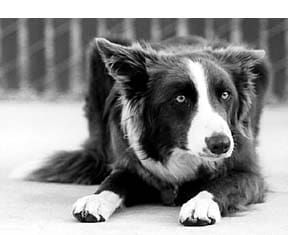Our six-year-old Chesapeake Bay Retriever, Killian, was recently diagnosed with colitis. I am so worried about my sweet 110-pound puppy dog. Could you please give us information on treating colitis in dogs?
We addressed this question to Dr. Russell Swift, a veterinarian from Tamarac, Florida. Dr. Swift utilizes homeopathy and herbs in his practice, and takes a special interest in nutrition and formulation of nutritional supplements.
Conventional medical practitioners use the word colitis to indicate inflammation of the colon (the large intestine), as opposed to inflammation of the small intestine or the stomach.
One of the large intestine’s most important roles is to absorb water. If the colon is not functioning properly, a lot of water is left in the stool; that’s diarrhea. There are many different types of diarrhea, and, unpleasant as it may be to contemplate, the characteristics of the diarrhea help us identify which part of the dog’s digestive system is not working properly.
An individual with inflammation of the colon would have frequent diarrhea, with the dog experiencing great urgency to defecate; he may have difficulty “holding it in.” In contrast, a dog with irritation of the small intestine usually produces diarrhea that is not as frequent and is more easily held in and controlled. Very frequent diarrhea and accidents in the house usually indicate large intestine irritation.
The other big difference between colitis and irritation of the small intestine is that, since most of the digestion and absorption of nutrients occurs before the food gets to the colon, few dogs with colitis suffer weight loss; they have absorbed most of the nutrients already in the small intestine.
Dogs with colitis are often treated for colitis pharmaceutically, with drugs that will stop the diarrhea. But anything that is solely designed to stop the diarrhea is just suppressing a symptom. Most people feel that if the diarrhea goes away, the problem is solved. But the problem is NOT solved; the dog simply no longer has the ability to express its health problem in that way. The question that must be asked is, “Why does the dog have diarrhea?” It’s important to recognize that you can also palliate or mask symptoms without drugs. If you add psyllium or a lot of high-fiber carbohydrates into the food, you may be able to stop the diarrhea. But by suppressing or palliating symptoms – even with “natural” remedies – over a long period, the underlying condition will likely get worse and the dog may develop far more serious symptoms later in life. If you must give the dog something that is really not a natural component of a dog’s diet in order to keep the bowel function properly, you’re just masking. Use of psyllium or marshmallow root for a short time (to give the dog temporary relief) can be useful as long as you keep this in mind.
Colitis can be caused by nutritional deficiencies or it may be a symptom of underlying chronic disease. I usually use a three-step approach to treating a dog with colitis.
Usually, the first thing I recommend for a dog with chronic colitis is to eliminate any external toxins on his body and in his environment: flea sprays, flea dips, carpet cleaning chemicals, ant sprays, etc. Also, if the dog is taking any medications, I’d like to look at the possibility that some of them can be reduced or eliminated, depending on the medication. Of course, this has to be done with proper guidance and supervision of an experienced veterinarian who understands what you are trying to do; not all veterinarians will!
Next, I look for nutritional deficiencies. Diet is the most important factor you can address. If you have an individual that is essentially healthy and you give him the wrong food, it’s like taking a car with an engine that’s in perfectly good shape and putting in the wrong fuel; it will develop symptoms of something not functioning properly. On the other hand, if there is something wrong with the engine AND you’re putting in the wrong fuel, you’ll see all kinds of problems that may well confound diagnosis. Say you’ve got a problem with the electrical system and you’ve got the wrong fuel. When you add the right fuel, the problems will shift so that you can detect and address the symptoms of the chronic problem – the electrical system.
The diet that I recommend for most dogs, but especially for dogs with colitis, would be a raw food, carbohydrate-free (personally, I do not use grains in my dog food recipe) diet, supplemented adequately with probiotic bacteria and digestive enzymes. (See Dr. Swift’s recipe for a homemade diet, above.) If the diarrhea was mild, I would try that for four to six weeks. If the diarrhea was very severe, you should consult a holistic veterinarian. If the symptoms do not improve significantly with the diet changes, it is an indication that the dog has an underlying imbalance. I would recommend classical homeopathy in an effort to find a remedy that would get to the deeper problem – whether it’s a vaccine-related problem, an emotional problem, an inherited tendency, or anything else.
Don’t dismiss the notion that an emotional problem could be contributing to the colitis. The digestive tract can indicate how well an individual is “digesting” life in an emotional sense. In this model, the colon has to do with getting rid of emotional waste. I’ve seen some cases in which an emotional issue seemed to be contributing to the dog’s colitis, and in most cases, this was treated successfully with a classical homeopathic approach.







I thought this would be a serious article that could help with my dog’s problem, then I got to the part you recommend homeopathy. Maybe we could call in a witch doctor too, or use a magic crystal? Tragic.
Just awful, no real information or receipe. What are the keys components of using a holistic dr?? No information included!! Really dispensing this to dogs with colitis!! Should be ashamed of this article! Take it off the web.. This article displayed no research proven to help dogs with colitis!!
I agree! I’m trying to find something to help my sick 10 week old puppy. I’m not putting her on a raw diet.
Love your reply. Pets have no choice in how their diseases are managed. Evidenced based practice is just that. Management of disease thru evidence. Researched, regulated and proven management. Homeopathy is a life style choice made by humans. If they thrive or fail with homeopathy thats their problem. But PLEASE don’t subject your pets to non evidence based care. And thats what homeopathy is. Non evidenced based ‘brews’.
Homeopathy is a valuable medicine that was founded by a Dr.Samuel Hanneman hundreds of years ago.
Having worked in the Veterinary field and seeing the profound and positive effects for dogs and cats, I feel your response is severely uneducated. Homeopathy is NOT a brew, it is a vibrational medicine based on the theory, “like treats like.”
In this way, it boosts the immune system and supports the area of the body that is weakened or out of balance.
I have seen remarkable results of bringing dogs back into balance, particularly skin problems, that often connected to digestion. Also, animals ARE vulnerable in ALL ways to humans, as we are in control of their lives, their comforts, their training, their routines, their diets, we are hugely responsible for their lives and should be treating them with loving and gentle care, such is homeopathy. Do your research and KNOW what Homeopathy truly is, before making your judgements. It is an amazing alternative choice that complaints western medicine.
Just awful, no real information or receipe. What are the keys components of using a holistic dr?? No information included!! Really dispensing this to dogs with colitis!! Should be ashamed of this article! Take it off the web.. This article displayed no research proven to help dogs with colitis!!
He gave his advice, a raw diet with added probiotic and digestive enzyme supplements. Resist temporary suppressive medications or solutions and keep an eye and consult with your vet. I think this is great advice. Each of your dogs is an individual you can’t expect an article online to fix your problems completely. Take information from different sources and make what you will of it but there is no need to discriminate against advice such as this. You have your own minds and your own vets, use them.
It is great advice but I love love a couple suggestions for probiotic bacteria with digestive enzymes and a couple raw diets since im clueless found one video and red flags went up when she let her eat broken up egg shells, all them sharp pieces made me fearful for the poor dog , and I worrie which probiotic with digestive enzymes is true to their ingredients
Hello Out There? What is a RAW diet? Raw meat, raw vegetables? Certainly NOT raw egg shells as suggested in an online video above. That’s just animal cruelty! And probiotics…there are tons out there…..No suggestions? Who wrote this article? Certainly not an informed vet! Sorry but this article is a complete waste of time! Certainly does not draw me closer to seeing a homeopathic vet by any means!
You have to grind up the eggshells into a powder…good source of calcium if not eating raw bones. I would like to give my dogs a raw bone but they get constipated.